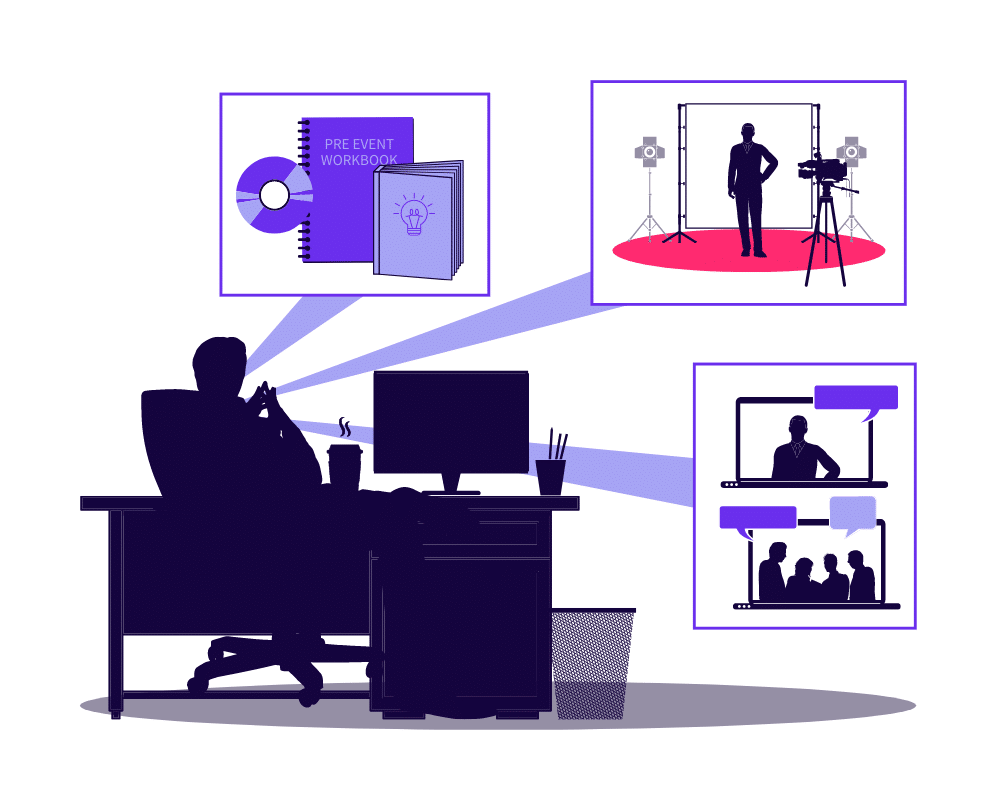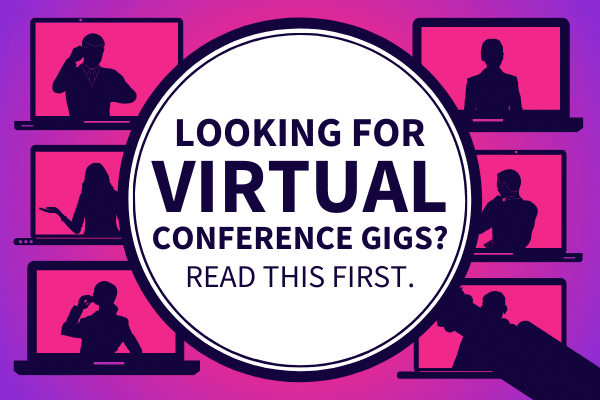As a professional speaker, regardless of your experience or area of expertise, there are several commonalities between you and your fellow speakers. From the tight itineraries of live events to the tech know-how needed for virtual ones, being a speaker comes with a plethora of challenges, all of which fluctuate with the speaking market year over year. However, there is arguably one challenge that remains a constant: finding speaking engagements. In 2020, especially, this obstacle became more apparent than ever. Even the most experienced speaker suddenly had to adapt their sales strategies to virtual conference and event opportunities, whether they had experience with virtual work or not.
In light of this challenge – and the inevitable continuation of virtual events moving forward – this guide is intended to help you navigate the basics of sales for virtual conferences. These include what they are, how they function, and how to find them. That way, you’ll not only have the confidence and knowledge to sell to virtual event organizers with ease. You’ll also be able to share your newfound expertise with your colleagues, contributing to the growth of the speaking industry as a whole and demonstrating your speaking business savvy in one fell swoop. What’s not to love about that? 🙂
How does a virtual conference work?

While virtual conferencing tools are relatively commonplace, virtual conferences themselves remain a comparatively new option for speakers and event organizers alike. If you haven’t attended or participated in one, a virtual conference is similar, in many ways, to a live event. Attendees can expect a wide variety of presentations just as they would for an in-person conference. These include live speakers, panel discussions, product demonstrations, and workshops. Likewise, speakers can participate in an equally wide range of events and audience-oriented offerings. However, unlike a traditional conference, every event is conducted 100% online. This allows everyone involved to access the event information, even with a tight schedule or budget. Event organizers, specifically, can dramatically lower their operating costs for the conference, as no travel or physical venue is necessary. These savings are then passed on to attendees, in terms of registration fees as well as event resources.
That said, you may be asking, “That sounds great for event organizers and attendees, but what about me, the speaker?” Essentially, as a virtual conference speaker, you benefit in many of the same ways that both of these groups do. No travel? Check. Faster segues from one presentation to the next? Check. Opportunities to provide additional value to clients and their audiences? Check and check!
In other words, in addition to the benefits of speaking for an in-person audience, speaking virtually allows you to save time, flex your tech and business aptitude, and efficiently share your message in a single motion. Because of these savings, you’re also able to be more flexible about your speaking fees if needed. This makes the “money conversation” with event organizers that much easier. We’ll come back to that shortly when we look at selling to virtual event planners.
What is the length of a virtual conference?
But, before we dive into sales specifics, it’s also important to note the duration of a virtual conference. As you might expect, because these events take place entirely in a virtual setting, many of the limiting factors of live events no longer apply. When a venue might have been unavailable, now a virtual conference room is wide open. When you may have been booked for a full-day in-person event, now they only need you for an hour. Where you would have had to coordinate flights and hotels, now you need only add the event to your calendar.
To put it simply, speaking for a virtual conference generally means much less time spent presenting, simply because most of the set-up, travel, and “filler” time is no longer necessary. However, much of this time saved is instead used for preparation or providing additional value. For example, for an hour-long presentation, you may also host a Q&A session immediately afterward. For a breakout presentation, you might also provide a workbook for audience members to build off of your guidance.
Essentially, while you may save time in terms of travel or your presentation alone, speaking for a virtual audience can be much more challenging, when it comes to engagement. Because every audience member can easily switch to another tab in their browser, your job is to make sure they don’t want to. This means more time invested in your prep work, your conversations with audience members, and your support for your client.
How do you sell to a virtual conference event organizer?
On that note, let’s talk about selling to virtual conference clients. Typically, if you’re selling to a previous client, a successful sale means proving you can repeat your previous work in a virtual setting. However, for potential clients, the sale can be a bit tougher, as you’re not just arguing for the worth of your speaking skills. You’re also demonstrating your skills surrounding virtual event organization, specifically. Combine these obstacles with a tight event budget, and showing your worth can be a daunting task.

To circumvent these challenges – because you are definitely worth hiring – there are five key things to keep in mind.
- Step up your studio game. To be an effective virtual speaker, you and the studio around you should be polished and professional.
- Prepare extensively. Before reaching out to a potential client, research their organization and their event. The more you know, the more easily you’ll be able to prove you’re the perfect fit.
- Expand your offerings beyond a presentation. If your fee buys pre- and post-event resources (workbooks, copies of your book, consulting, etc.) you’re more likely to have an impact (and get hired).
- Anticipate client objections. Whether it’s cost, availability, or your depth of experience, prepare rebuttals for anything that may keep you from getting hired.
- Keep things short and sweet. Show event organizers you’re there to make an impact but you’re also efficient and easy to work with.
Together, these elements – or “SPEAK” for short – demonstrate to event organizers that you care beyond the money. Even without a paycheck, you went out of your way to prepare, get to know their needs, and tailor your offerings to them. That way, you can be there before, during, and after your presentation to ensure it’s as impactful as possible. No event organizer will turn that down!
How do you find virtual conference gigs?
To find virtual conference organizers and put these sales strategies in action, there are a few routes you can take. The first is the all-too-well-known option of speaking opportunity lead lists. For many years and many speakers, these lists have been the go-to source of potential opportunities because of their accessibility and the ease with which you can find event organizer information in a single place. However, because of these benefits, these lists are widely distributed and, in many cases, overused. As a result, many of the organizers on the list receive a multitude of speaker proposals. This makes it much harder for you stand out from the crowd of options in their inbox, not to mention the fact that their contact information could very easily be outdated in the first place (as is the case with too many lead databases).
Considering these issues, here, we’re going to focus on two other common methods for finding virtual conference opportunities. We’ll also touch on a few speaker-specific apps and tools to help you manage your leads as well as find them. That way, you can stay organized and close sales one after the other, all while making it easy on yourself and your team.
Finding Virtual Conferences Manually
Besides lead lists, the first way to find virtual conference gigs is by searching manually. Nowadays, all it takes is a Google search to find a company or a person. Want to find an event organizer’s email address? How about a company’s revenue for last year or their number of employees? Maybe you want to know more about their previous events and whether or not one of your competitors has spoken for them in the past. Whatever you’re looking for, Google likely has the answer.

That said, in many cases, an organization’s website or their page for an upcoming event isn’t structured with search engine optimization (SEO) in mind. Consequently, when you search for a topic that appears on their website, it may not show up in a Google search, making it incredibly difficult to find qualified leads in a reasonable amount of time.
One way to work around this is to include Boolean operators in your Google search. In the words of Southern Adventist University, these search additions are “words or symbols [that] combine or exclude keywords in a search” and, by using them, you more easily “focus your search on the results that will be most helpful”. Within our own team, for example, we might add “inurl:” in front of the word “speakers bureau” to find a list of bureaus or “filetype:pdf” after “one sheet” to see a list of speaker one-sheets. Likewise, when you’re searching for virtual conference gigs, using Boolean functions can help you find what you’re looking for more easily than you would with a simple search. For a full list of Boolean functions, I recommend checking out the Ahref’s Guide to Google Search Operators.
Finding Virtual Conferences Using the Speaker Intel Engine
On the other hand, if you want the quickest way to find virtual conference gigs (or any gigs, for that matter), your best bet is the Speaker Intel Engine. Unlike lead lists, the Intel Engine essentially acts as a Google search overlay. This allows you to run those complex Boolean functions that we just covered. However, instead of having to find and remember the right functions to use, the Intel Engine automatically applies them for you.
For example, if you wanted to find 2021 virtual conferences in the banking industry, all you would need to do is to open the Intel Engine, add these search terms to the appropriate boxes for “Industry” and “Year,” and click the button for “Future Virtual Events.” From there, the Intel Engine would automatically apply the relevant Boolean functions and generate a list of Google search results that meet those criteria, all in a matter of seconds. That’s a fraction of the time it takes to manually find those results. Plus, you know that they’re not part of a lead list that countless other speakers are using to sell. Win, win!
All of that said, if an image is worth a thousand words, a video is worth more than I have space to type. With that in mind, to learn more about finding virtual conference gigs as quickly as possible using the Intel Engine (and without having to read my explanation of Boolean functions 😉 ), check out the demo video by its creator, speaker and sales expert Sam Richter.
Additional Information for Selling to Virtual Conference Organizers
Ultimately, like closing the sale for a live event, closing virtual conference gigs is all about preparation. From the day you come across a lead to the day that now-client says goodbye, your goal is to provide as much value as possible. Combine that value with an easy-going and efficient approach to managing a speaking business, and you’re sure to generate referrals from client after happy client. That way, you can spend a couple of hours (rather than dozens) each month looking for virtual conference leads, saving time and stress and making steady revenue in the meantime.
For more information about finding speaking engagements – virtual or otherwise – check out our previous guides, “How To Get Speaking Gigs: The Ultimate Guide” and “Where To Find Speaking Engagements: The Complete List.”
Additionally, for tools that drive consistent sales efforts, check out our operating system! We know the challenges of the industry better than most, and within our team, we’re always creating and sharing content to make those challenges less intimidating. So, if you’re looking to grow your speaking business without having to go it alone, we – and the technology we offer – are here to help. 👍






